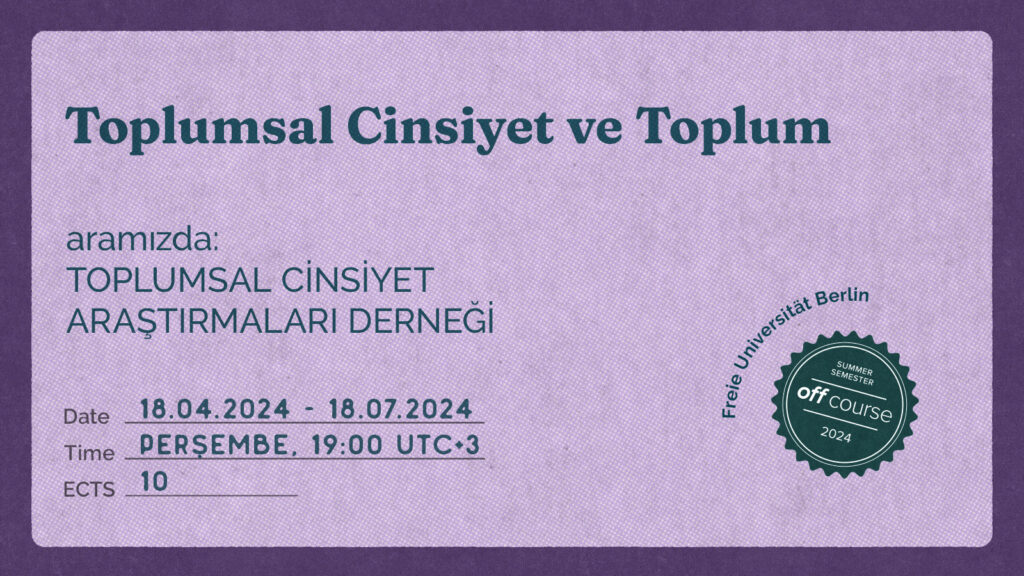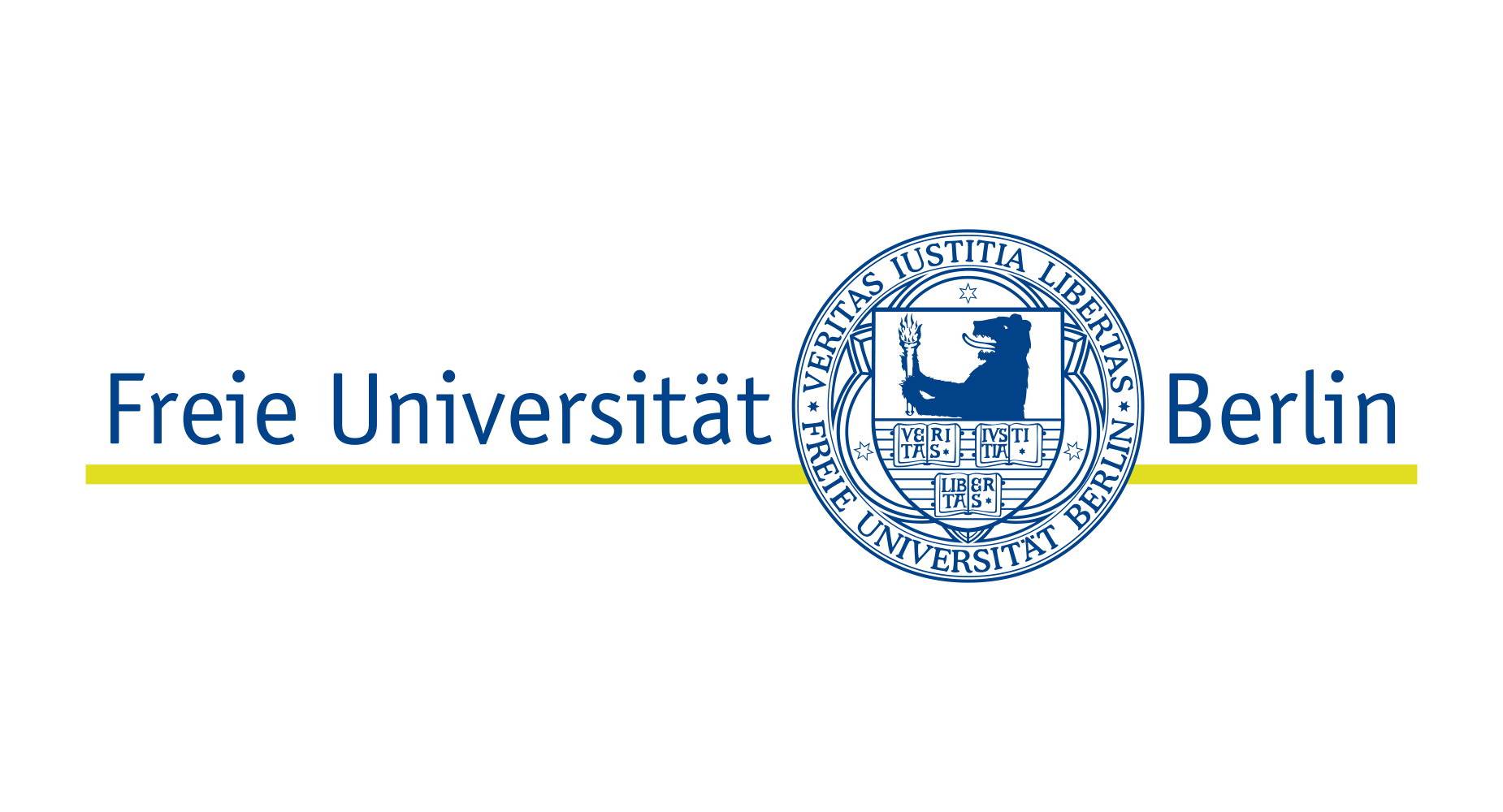Overview
This course offers a critical overview of Gender Studies, an interdisciplinary academic field that explores crucial questions about the meaning of gender in society. Its primary goal is to familiarize students with key issues, questions, and historical and contemporary debates in Gender Studies. Within this scope, we aim to explore together with the students the complex ways in which gender intersects with class, race, ethnicity, sexuality and age within various spheres and institutions of Turkish society.
Topics include feminism, LGBTIQ+ /gender rights activism, class, ethnicity, law, masculinities, nationalism, Islam, media, cinema, memory, human rights and authoritarianism with a strong emphasis on gender debates in Turkey.
Learning Outcomes
Through successfully completing this course, participants will be more competent to participate in and contribute effectively to larger public debates about the role of gender in society; to apply critical tools of women’s, LGBTI+’ and gender studies in their academic and personal lives and careers; and to attend advanced classes in this field.
They will be able to:
- Investigate issues and debates on gender, particularly in relation to Turkish society
- Identify and explain the ways in which gender shapes our everyday lives through the intersections of race, class, sexuality, age, religion, culture, and nation
- Discuss the ways in which systems of power, privilege, and oppression shape our experiences as individuals and members of communities
- Develop a critical vocabulary that includes key theoretical debates in historical and contemporary gender studies
- Demonstrate research literacy, through library search
andskills, and the development of critical discussion, and academic referencing - Write logical and coherent arguments based on evidence and engage in critical debate
Course Outline
Week 1 – Introduction to the Key Concepts
Instructor: Ezgi Sarıtaş
The aim of this course is to provide a general introduction to the concepts of patriarchy, gender, and sexism. The development of the concept of gender in the light of feminist and queer politics and theory, and different understandings and applications of the concept will be discussed in the context of current debates. Using the tools of feminist, trans and queer critique, the historic emergence and normalization of the gender binary will be discussed.
Week 2 – Who is the Subject of Feminism?
Instructor: Melek Zorlu
This session traces feminist subject matters in order to reconsider the contemporary feminist policy debate. The possibilities of conducting politics together despite differences, the areas opened by queer theory, and the effects of trans-exclusionary radical feminism on feminist politics will be discussed in this context.
Week 3 – 100 Years of Women in Turkey
Instructor: İlkay Kara
In this session, the women’s an feminist movements in the 100-year history of the Republic of Turkey will be discussed. The main political orientations, demands, objections and organizational forms of the movements will be reviewed from a historical perspective.
Week 4 – The Condition of the LGBTI+ in Turkey
Instructor: Merve Diltemiz Mol
This session aims to analyze the current problems of the LGBTI+ community in Turkey, human rights violations, and the organized and individual struggles to combat these problems and violations. It will involve a brief discussion of the rights of the LGBTI+ community and an analysis of the LGBTI+ movement in Turkey within the framework of social movements theory.
Week 5: Sexual Control of the Female Body under the Pressure of Aging/Ageism
Instructor: Evun Okumuş
Bio-power mechanisms include oppression and destructive processes of the right of women and LGBTI+ people to control their own bodies in a patriarchal system. In light of this, in this session, I will focus on feminist critiques of how the male mind controls the female body and that of LGBTI+ people for the comfort of men in a patriarchal society.
In its English usage, ageism is mostly used to describe prejudices and discriminatory practices against older people, it has also been used to describe discriminatory practices against young people and children in some sources. In this session, the problems of ageism and sexual repression based on age for women and LGBTI+ people will be discussed.
Week 6: Human Rights, Accountability and Reparation: A Gender Perspective
Instructor: Hülya Dinçer
This session aims to critically assess the evolution of the international human rights regime from a gendered perspective. It intends to reveal the implications of the public/private distinction for international human rights law. Drawing on a study of human rights instruments and mechanisms of accountability and reparation, it intends to question gendered definitions of categories of crime, violation, and damage that have historically excluded women and LGBTI + people from legal protection against violence.
Week 7: Anti-war movements and women and LGBTI+ movements
Instructor: Hülya Kendir
Gender criticism and struggle in anti-war movements, common claims, actions, and organizations of anti-war movements and women and LGBTI+ movements in Turkey.
Week 8: Women’s Movement and Environmental Movement
Instructor: Özlem Şendeniz
This session will focus on the intersection of the women’s movement and the environmental movement, with field examples from rural areas of Turkey. It aims to consider central theoretical debates and local experiences together.
Week 9: Solidarity Economy and Gender
Instructor: Hande Dönmez
The aim of this session is to discuss the transformative potential of solidarity economies and the constraints they reproduce from a gender perspective. The theoretical framework that intersects debates on ecology, labor and democracy on the axis of patriarchal relations will be discussed through current experiences from Turkey.
Week 10: Disaster and Gender
Instructor: Aslı Kayhan
In this session, we will discuss the problems of women and LGBTI+ people in emergency management and planning during natural disasters, following theoretical discussions, experiences and reports.
Week 11: Islam and Gender
Instructor: Deniz Parlak
Religion and gender, Muslim feminism, a feminist perspective on discourse and practices towards women and LGBT+ people in the current political climate.
Week 12: Nationality and Gender of the Press: Kurdish Women’s Journalism
Instructor: Fatma Sönmez
In this session, one of the most significant moments of Kurdish press history will be discussed with regard to Kurdish women journalists and their experiences. By focusing on the period of 1990-2001 when the Kurdish political movement witnessed a popularization via publishing a daily newspaper, this session will present a historical and women-oriented insight to the Kurdish press practices.
Week 13: Feminist Art in Turkey
Instructor: Didem Dayı
The aim of this session is to take a look at the development of feminist art in Turkey and the stages it has gone through until today.
Week 14: Forum: Further steps to take!
With the participation of all instructors
An open discussion on Gender and Society with a particular focus on Turkey in light of the issues and themes discussed in the course.
Instructors
13 Scholars from Aramızda: Toplumsal Cinsiyet Araştırmaları Derneği:
Aslı Kayhan, Melek Zorlu, Hülya Kendir, Merve Diltemiz, Deniz Parlak, İlkay Kara, Fatma Sönmez,
Hülya Dinçer, Ezgi Sarıtaş, Hande Dönmez, Özlem Şendeniz, Evun Okumuş, Didem Dayı
Founded in November 2017, Aramızda: Toplumsal Cinsiyet Araştırmalar Derneği is invested in creating a pluralistic space of feminist solidarity that provides a platform for networking, creativity and research in the field of Gender and Queer Studies. The founding members of the collective are feminist academics and students who were dispelled from the university as a result of a governmental decree, or faced dire conditions with regards to the right for education on gender and LGBTIQ+ studies and to the support mechanisms in preventing sexual harassment in the campus. Together, they responded to this situation by claiming a space outside of the university, to continue their studies, research and organizing in the realm of the arts, civil society and politics. 13 of Aramızda’s scholars are currently collectively organizing this course with Off University.
Certification
This course is hosted by Freie Universität Berlin and certified with 10 ECTS upon successful completion.
Please check the course requirements from the course syllabus and inform your instructor(s) about your request to receive a certificate for this course.
You will find the full syllabus on Moodle course page.
At the end of the semester, the instructors will inform the learning designer about your request and grade. The certificate will be prepared with the university secretariat and it may take up to 8 weeks.
Registration
Our courses are held on a digital learning platform, Moodle. Before you create your account on Moodle, we have some notes for your and others’ digital security.
- When you register, you can use a nickname. Nicknames with offensive, racist or sexist undertones will not be accepted.
- Communication outside of the platform is not private. It is a solidarity action with people who would like to stay anonymous for different reasons. Please use our secure platform to communicate with others and respect their choices of communication channels.
- We aim to create an inclusive learning environment with our participants and educate ourselves in a more inclusive language. Be eager and tolerant to learn from each other and challenge any discriminating language. You can have a look at it here.
Creating a new account and registering to a course on Moodle
1. The link will take you to the Off University Moodle homepage.
2. Click the “Log in” button on the top right side of the page.
If you have an account on Off University Moodle, please login and continue from step 7 below.
3. Scroll down to see “Create new account” and click the button.
4. Please fill in the fields marked as *required.
You can use false information to protect your identity and increase your safety. You can enter a nickname, a false email address that resembles the format, such as name@example.org etc. Please note down your user name and password in a safe place.
5. Once you created your account, please wait until the next working day to continue.
Your account needs activation which will be done by Off University. We will need some time to activate your account. This can take up to 24 hours on weekdays and longer on weekends.
6. Please login to check whether your account it active. Once you can login, you will find the available courses on the home page of Moodle and will be able to register by clicking the course title.
7. You can now discover the course page. The first item on the page, General, contains the syllabus and the announcements. Please follow these announcements to stay up to date about your course.




